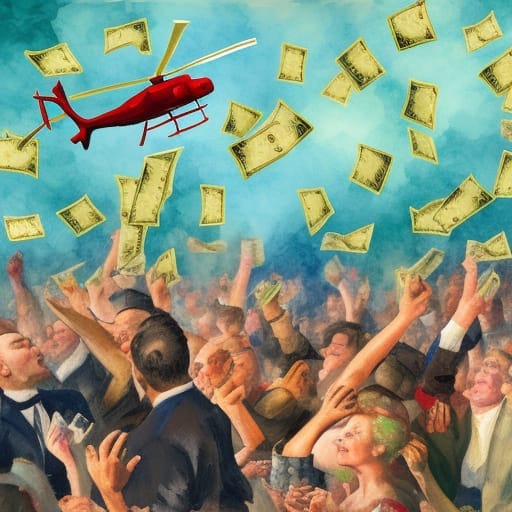
The economist John Cochrane has recently released his new book The Fiscal Theory of the Price Level (FTPL), which purports to offer a new theory of how inflation occurs. A few notes and thoughts:
Milton Friedman famously stated that “inflation is always and everywhere a monetary phenomenon”. The price level according to Friedman, is roughly speaking the amount of money in a society divided by the amount of goods and services available in that society. Thus inflation happens when too much money chases too few goods.
To be fair to Friedman, John Cochrane says he was “90 percent right“. Both the monetarist theory and the FTPL predict that inflation will occur if the government prints money and “drops it from helicopters” - i.e. hands it out to people. This makes intuitive sense - if a government just prints money and economic output stays the same, prices should increase (otherwise, everyone would magically get richer).
So how is FTPL different? Well, Cochrane argues that money is a special case of government debt. If the government wants to take in more money, but not from taxes, they can issue government bonds - available for anyone to buy. Government bonds are pretty similar to money, and people are happy to hold them, since they usually pay a little interest. Cash, according to Cochrane, is just like short-term government bonds. Hence, FTPL predicts that if the government prints dollar bills and drops it from helicopters, but simultaneously take away an equal amount of people’s government bonds, no inflation will occur. In the monetarist view, this scenario would cause inflation - since the dollar bill supply has increased.
Cochrane makes the analogy that money is like stock in the government. And just like the value of a stock is fundamentally determined by the underlying health of the company, the value of money depends on the underlying health of the government. The price level then will depend on 1) the level of government debt in relation to the expected future fiscal behaviour of the government and 2) how large and productive the economy is and will be.
Suppose the finance minister would go on television and credibly state:
“We are going to spend a lot of money starting now. If we spend more than we collect in taxes, we’re just going to print more money to cover the difference“
What would you think and do? You would probably conclude that money will be worth less in the future, and try to get rid of it before it happens. Maybe you would buy stocks, bonds or something else of value. Any one person could maybe avoid the negative impact, but collectively, it would be impossible.
It’s easy to see that the above would be an example of how (bad) fiscal policy would cause inflation. In this scenario, what could central banks do? Raise interest rates? Well, according to Cochrane, raising interest rates will temporarily lower inflation below what it would be if the central bank would do nothing. But this temporary lowering would come at the expense of higher inflation later. To make an analogy: raising interest rates is more akin to “flattening the curve” rather than to avoid the epidemic altogether.
According to Cochrane, the current inflation is the predicted result from the fiscal-stimulus shock (helicopter-money drop) governments enacted as a response to Covid-19. In 2020/2021, the US government printed, borrowed and spent 5 trillion dollars. Put in understandable terms, this equates to 15 000 dollars of new money - per US citizen. Large stimulus packages were enacted also in Europe, partly by the EU and partly by individual countries. In Sweden, the US, UK and the EU-area money supply has increased markedly in response to the pandemic. Given this growth in the money supply; while keeping constant future trust in government and real economic output, FTPL then dictates that inflation has to occur.
What would have happened if those fiscal stimulus packages weren’t enacted, or at least weren’t as large? What would have happened if central banks wouldn’t have raised interest rates? Maybe not as much as politicians and central bankers would have us believe.

Yes indeed!
As he says himself: “in this book I argue that the fiscal theory is a genuinely new theory that unseats its predecessors at the foundation of monetary economics”
When called out in an interview that this was a bold statement, he replied “Boy, I get excited behind the keyboard, don’t I” :)
In my previous post I complained about the lack of ambition amongst economists and here comes a brand new theory of inflation :)